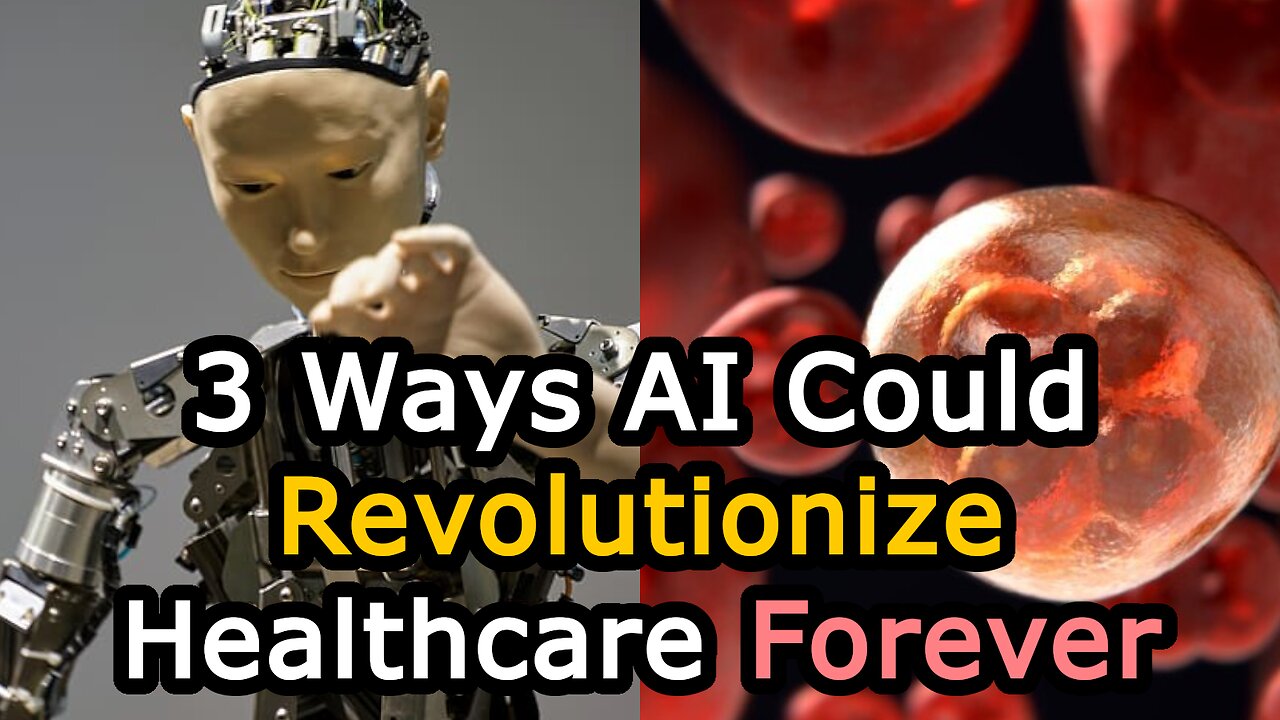Premium Only Content

3 Ways AI Could Revolutionize Healthcare Forever
Twitter: https://twitter.com/iv_times
Instgram: https://www.instagram.com/iv_times/
Truth Social: https://truthsocial.com/@ivtimes
TikTok: https://www.tiktok.com/@ivtimes
Music: Big Sky by Infraction
• Cinematic Inspira...
Transcript:
In the vast expanse of the digital age, a new dawn is breaking in the realm of healthcare. Artificial Intelligence (AI), once a concept confined to the realms of science fiction, is now a reality that is transforming the landscape of medical science. This groundbreaking technology is redefining the boundaries of what is possible, ushering in a new era of innovation and discovery. AI and Alzheimer's Disease Alzheimer's disease, a debilitating neurodegenerative disorder, has long posed significant challenges to healthcare professionals due to its complex nature and the difficulty in early detection. However, AI is changing the game. A study published in the journal "Alzheimer's & Dementia: The Journal of the Alzheimer's Association" revealed that an AI model developed by researchers at the University of Florida could predict Alzheimer's disease up to two years before its onset with an accuracy of over 90%. The model uses patient medical records and genetic data to make its predictions, offering a new hope for early detection and intervention. Moreover, researchers at Harvard Medical School are using AI to target Alzheimer's at a molecular level. They have developed an AI model that can identify key patterns in brain connectivity associated with Alzheimer's, which could potentially lead to new therapeutic targets. AI is also being used to detect early signs of Alzheimer's in speech patterns. A study by UT Southwestern Medical Center found that AI can identify subtle changes in speech complexity and semantic density that can indicate early-stage Alzheimer's. It is clear that AI is becoming an indispensable tool in the fight against Alzheimer's disease. AI and Cancer Cancer, one of the leading causes of death worldwide, is another area where AI is making significant strides. AI is being used to enhance early detection, improve treatment strategies, and even discover potential new drugs. In Canada, AI is being used to advance breast cancer research. A study funded by the Canadian Cancer Society is using AI to analyze mammograms and pathology reports, aiming to improve the accuracy of breast cancer diagnosis. AI is also being used to predict aggressive prostate cancer. A study by the U.S. Department of Veterans Affairs is developing an AI model that can predict the aggressiveness of prostate cancer, which could help doctors tailor treatment strategies to individual patients. Furthermore, researchers at the University of Toronto used AI to discover a potential new cancer drug in less than a month. This highlights the potential of AI in accelerating drug discovery and bringing new treatments to patients faster. AI and Mental Health Finally, Mental health, often stigmatized and overlooked, is an area where AI could have a profound impact. AI is being used to provide therapeutic interventions, improve diagnosis, and even offer companionship. AI is being used to help with mental health issues such as depression and anxiety. For instance, an AI voice coach developed by the University of Illinois at Chicago showed promise in psychotherapy for depression and anxiety. The voice coach uses AI to provide personalized feedback and therapeutic interventions. AI is also being used to help workers manage stress and improve mental health. AI-backed tools, such as virtual reality and chatbots, are being used to provide stress management techniques and mental health support. Moreover, AI is being used to create virtual companions. Blush, an AI dating sim from the team behind Replika, is designed to help users build relationship and intimacy skills. These AI companions can provide emotional support and companionship, which can be beneficial for mental health. In conclusion, AI is revolutionizing healthcare in ways that were unimaginable just a few years ago. From predicting Alzheimer's disease years before onset, to improving cancer diagnosis and treatment, to providing support for mental health, AI is at the forefront of healthcare innovation. As we continue to harness the power of AI, we can look forward to a future where healthcare is more personalized, efficient, and effective. Looking ahead, we can't help but wonder about the vast potential of AI in healthcare. Could we be on the brink of a future where AI algorithms can predict our health risks and provide personalized preventive measures? Could AI-driven research lead to the discovery of cures for diseases that are currently incurable? Could AI eventually eliminate the trial-and-error approach in medication, leading to precise treatments with minimal side effects? Could AI companions become a common part of our daily lives, helping us navigate the complexities of mental health? The dawn of AI in healthcare is here, and it's transforming the landscape in ways we are only beginning to understand. As we stand on the cusp of this new era, the potential of AI in healthcare is both exciting and awe-inspiring. The journey ahead is filled with promise, and as we continue to explore and harness the power of AI, the possibilities are limitless.
-
 42:52
42:52
The Finance Hub
15 hours ago $3.08 earnedBREAKING: ALINA HABBA JUST SHOCKED THE WORLD!
10.5K28 -
 2:00:44
2:00:44
BEK TV
1 day agoTrent Loos in the Morning - 8/26/2025
13.4K -
 12:15
12:15
Nikko Ortiz
19 hours agoMonday Gun Fails
69.7K16 -
 8:19
8:19
MattMorseTV
18 hours ago $12.36 earnedTrump is ACTUALLY DOING IT.
68.9K54 -
 5:40
5:40
Sugar Spun Run
1 day ago $1.13 earnedNutella Brownies
20.3K2 -
 8:46
8:46
Faith Frontline
17 hours agoBill Maher STUNNED as Charlie Kirk Proves God Exists
22K19 -
 LIVE
LIVE
FyrBorne
11 hours ago🔴Warzone M&K Sniping: On the Hunt For The Next Fun Builds
129 watching -
 7:11
7:11
MudandMunitions
14 hours agoNY Legal, Still LETHAL! Colt M4 + Griffin Armament GPS3X Prism Sight! NIGHT SHOOT
13.9K3 -
 2:11
2:11
WildCreatures
2 days ago $0.73 earnedBrilliant Blue Hyacinth Macaw Eats Nuts With Impressive Dexterity
12.1K6 -
 24:50
24:50
Bitcoin.com
17 hours agoEthereum hit an ATH this weekend | The Weekly Recap for Aug 25
14.9K